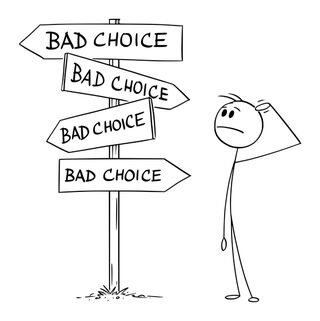Anxiety
Medicine: The Next Frontier
How do we deal with the contradictory findings in current medical research?
Posted November 5, 2022 Reviewed by Vanessa Lancaster
Key points
- Medical research is often fraught with contradictions, making decisions difficult for individuals.
- Personalized medicine offers promise, and there is no “one size fits all."
- Addressing anxiety and depression can improve medical outcomes.
- Mindfulness meditation techniques and virtual reality can improve medical outcomes.

Medical research is fraught with confusing contradictions such that individual clinical decisions are much more random than they seem. For instance, selective serotonin reuptake inhibitors are first-line medications for treating depression.1
Yet, a recent review concluded that serotonin has little to do with depression, and antidepressants may even lower serotonin long-term2. Although lowering cholesterol can protect your heart,3 it is also associated with a greater chance of dying.4 Antioxidants in broccoli, spinach, and carrots, may protect against cancer or accelerate it.5 To add to this conundrum, only 25 percent of published findings can be replicated.6
Given that this is the case, if you walked into a doctor’s office, it would be very difficult to convincingly recommend using an SSRI, lowering your cholesterol, or using antioxidants. There’s no way of telling whether you’d be making your life better or worse. How do you deal with these contradictions? Below are some suggestions to optimize your health.
Track Your Own Health
Some may conclude that science cannot offer anything, but I would contest that. We at least know that we cannot generalize findings from any study. And because of these contradictions, some scientists recommend that everyone should have their recommendations based on their unique biological profiles. Called an n-of-1 trial, this personalized approach to medicine may advance our current approach to studying groups of people.7 This can be a little unwieldy as a single person’s biology is likely to change as they age, and their life circumstances change too.8 The medical system is still trying to figure out how to implement this. It helps to know that there is no “one size fits all” solution.
Believe in a Positive Outcome
Committing to the belief that whatever intervention one chooses will work may improve the outcome. For example, hypnosis may help improve pain, anxiety, sleep, self-efficacy, and overall health and well-being.9 Except for the disappointment, if this does not work, hypnosis is generally considered safe.10 Even placebo (sham treatments) can help pain and anxiety, suggesting that when you believe that a chosen path works, you might boost your chances of getting better.11
Decrease Your Anxiety and Depression
Both depression and anxiety have been variably associated with a greater chance of dying.12,13 Anxiety is associated with asthma, COPD, diabetes, hypertension, and heart disease.14 Both anxiety and depression may worsen the course of medical disorders because of their effect on proinflammatory factors, the hypothalamic-pituitary axis, the autonomic nervous system, and metabolic factors.15
Optimize the messaging from your genes to your cells.
As you get older, the caps at the ends of your chromosomes get shorter and shorter, but this happens for different people at different rates. When this happens faster, it may predispose you to heart disease, atherosclerosis, diabetes, and death.
Mindfulness practices such as mindfulness meditation,16 Zen meditation,17 asana and pranayama (yoga practices),18 and transcendental meditation19 all protect the telomere, thereby protecting the body from disease and potentially prolonging life. Engaging in one of these practices is, therefore, likely to help protect you regardless of what medical route you choose.
Virtual Reality (VR) Experiences
When you use VR, your brain makes you believe you are immersed in the virtual environment. When that environment is calming, such as nature, anxiety is reduced,20,21 thereby potentially improving outcomes in diseases where anxiety worsens the outcome, such as those mentioned above. VR may also reduce pain,22 and one study demonstrated that mindfulness-based VR could improve outcomes in inflammatory bowel disease.23 VR has been identified as useful in nervous system diseases and helps improve balance and motor function.24 It is an integral part of Health 4.0—the future of medicine.
So, when you’re faced with the contradictions in medicine and are not sure of what to choose, know that regardless of how the choice is made in discussion with your treater, one size does not fit all, and belief, decreasing anxiety and depression, mindfulness practice and VR can all potentially contribute to a better outcome for you. Discuss these elements with your treater than next time you see them.
References
1. Chu A, Wadhwa R. Selective Serotonin Reuptake Inhibitors. In: StatPearls. StatPearls Publishing; 2022. Accessed November 5, 2022. http://www.ncbi.nlm.nih.gov/books/NBK554406/
2. Moncrieff J, Cooper RE, Stockmann T, Amendola S, Hengartner MP, Horowitz MA. The serotonin theory of depression: a systematic umbrella review of the evidence. Mol Psychiatry. Published online July 20, 2022:1-14. doi:10.1038/s41380-022-01661-0
3. Yi SW, Yi JJ, Ohrr H. Total cholesterol and all-cause mortality by sex and age: a prospective cohort study among 12.8 million adults. Sci Rep. 2019;9:1596. doi:10.1038/s41598-018-38461-y
4. Liu Y, Liu F, Zhang L, et al. Association between low density lipoprotein cholesterol and all-cause mortality: results from the NHANES 1999–2014. Sci Rep. 2021;11:22111. doi:10.1038/s41598-021-01738-w
5. Poljsak B, Milisav I. The Role of Antioxidants in Cancer, Friends or Foes? Curr Pharm Des. 2018;24(44):5234-5244. doi:10.2174/1381612825666190123112647
6. Prinz F, Schlange T, Asadullah K. Believe it or not: how much can we rely on published data on potential drug targets? Nat Rev Drug Discov. 2011;10(9):712-712. doi:10.1038/nrd3439-c1
7. McDonald S, Nikles J. N-of-1 Trials in Healthcare. Healthcare (Basel). 2021;9(3):330. doi:10.3390/healthcare9030330
8. Guillien A, Cadiou S, Slama R, Siroux V. The Exposome Approach to Decipher the Role of Multiple Environmental and Lifestyle Determinants in Asthma. Int J Environ Res Public Health. 2021;18(3):1138. doi:10.3390/ijerph18031138
9. Wallen GR, Middleton KR, Kazmi NB, Yang L, Brooks AT. A Randomized Clinical Hypnosis Pilot Study: Improvements in Self-Reported Pain Impact in Adults with Sickle Cell Disease. Evid Based Complement Alternat Med. 2021;2021:5539004. doi:10.1155/2021/5539004
10. Häuser W, Hagl M, Schmierer A, Hansen E. The Efficacy, Safety and Applications of Medical Hypnosis. Dtsch Arztebl Int. 2016;113(17):289-296. doi:10.3238/arztebl.2016.0289
11. Colloca L. The Fascinating Mechanisms and Implications of the Placebo Effect. Int Rev Neurobiol. 2018;138:xv-xx. doi:10.1016/S0074-7742(18)30027-8
12. Oude Voshaar RC, Aprahamian I, Borges MK, et al. Excess mortality in depressive and anxiety disorders: The Lifelines Cohort Study. Eur Psychiatry. 2021;64(1):e54. doi:10.1192/j.eurpsy.2021.2229
13. Meier SM, Mattheisen M, Mors O, Mortensen PB, Laursen TM, Penninx BW. Increased mortality among people with anxiety disorders: total population study. Br J Psychiatry. 2016;209(3):216-221. doi:10.1192/bjp.bp.115.171975
14. Aquin JP, El-Gabalawy R, Sala T, Sareen J. Anxiety Disorders and General Medical Conditions: Current Research and Future Directions. Focus (Am Psychiatr Publ). 2017;15(2):173-181. doi:10.1176/appi.focus.20160044
15. J. Katon Wayne. Epidemiology and treatment of depression in patients with chronic medical illness. Dialogues Clin Neurosci. 2011;13(1):7-23.
16. Dasanayaka NN, Sirisena ND, Samaranayake N. The effects of meditation on length of telomeres in healthy individuals: a systematic review. Syst Rev. 2021;10:151. doi:10.1186/s13643-021-01699-1
17. Alda M, Puebla-Guedea M, Rodero B, et al. Zen meditation, Length of Telomeres, and the Role of Experiential Avoidance and Compassion. Mindfulness (N Y). 2016;7:651-659. doi:10.1007/s12671-016-0500-5
18. Rathore M, Abraham J. Implication of Asana, Pranayama and Meditation on Telomere Stability. Int J Yoga. 2018;11(3):186-193. doi:10.4103/ijoy.IJOY_51_17
19. Wenuganen S, Walton KG, Katta S, et al. Transcriptomics of Long-Term Meditation Practice: Evidence for Prevention or Reversal of Stress Effects Harmful to Health. Medicina (Kaunas). 2021;57(3):218. doi:10.3390/medicina57030218
20. Beverly E, Hommema L, Coates K, et al. A tranquil virtual reality experience to reduce subjective stress among COVID-19 frontline healthcare workers. PLoS One. 2022;17(2):e0262703. doi:10.1371/journal.pone.0262703
21. Croghan IT, Hurt RT, Aakre CA, et al. Virtual Reality for Health Care Professionals During a Pandemic: A Pilot Program. J Prim Care Community Health. 2022;13:21501319221086716. doi:10.1177/21501319221086716
22. Matamala-Gomez M, Donegan T, Bottiroli S, Sandrini G, Sanchez-Vives MV, Tassorelli C. Immersive Virtual Reality and Virtual Embodiment for Pain Relief. Front Hum Neurosci. 2019;13:279. doi:10.3389/fnhum.2019.00279
23. Wren AA, Neiman N, Caruso TJ, et al. Mindfulness-Based Virtual Reality Intervention for Children and Young Adults with Inflammatory Bowel Disease: A Pilot Feasibility and Acceptability Study. Children (Basel). 2021;8(5):368. doi:10.3390/children8050368
24. Liu Z, Ren L, Xiao C, Zhang K, Demian P. Virtual Reality Aided Therapy towards Health 4.0: A Two-Decade Bibliometric Analysis. Int J Environ Res Public Health. 2022;19(3):1525. doi:10.3390/ijerph19031525


